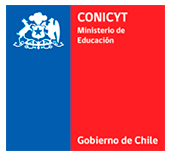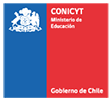Español
PCI – Program of International Cooperation
The Program of International Cooperation, PCI, was established in 2000. Its mission is to encourage joining and strengthening international networks, with the goal of integrating Chile’s scientific community into frontier knowledge.
Director (s): Rodrigo Monsalve
Budget 2013: USD 6,09 millones
Line of Action: Promoting and supporting the integration of Chile’s scientific community with its colleagues abroad, based on scientific excellence, mutual benefits, and common interests, under different collaboration modalities and in the framework of S&T cooperation agreements with foreign agencies.
Funding Instruments
- Program for the Development of Research Projects between Chile and the United States (NSF).
- Bilateral joint research programs with France (ANR), Finland (AKA), Switzerland (SER), Argentina (ANPCyT), and Germany (DFG).
- Support for the establishment of networks and of ties between Chilean research centers and centers from other countries.
- Multilateral networks: S&T Ibero–American Program for Development (CYTED), Inter–American Program for Materials Science (CIAM), Regional STIC–Amsud Program for Information and Communication Technologies (ICTs), and MATH–Amsud for Math.
- International Scientific Cooperation Program (PCCI) for exchange programs with France, Germany, Mexico, Colombia, Argentina, and Brazil.
- European Union Program, which considers different thematic areas for cooperation and advises Chilean researchers, in order to help them enhance their participation in the Seventh Framework Program.
- “Abate Juan Ignacio Molina Award” as a recognition of Chilean scientists for the career and scientific work of a German researcher in any knowledge area.
Main Achievements in 2012
- A total of 28 international network programs between research centers and the United States, Brazil, the United Kingdom, Japan, Germany, China, and Mexico.
- 45 bilateral exchange projects with Colombia, France, and Germany.
- 12 new exchange projects in multilateral research networks, through the STIC–Amsud and MATH–Amsud programs.
- 14 fellowships and 8 networks established between research centers in the area of Energy and counterparts in Spain, the United Kingdom, Australia, Canada, Brazil, and New Zealand.
- Six joint research projects with the United States in the fields of seismology / anti–seismic engineering, ecology and biodiversity, and oceanography. These projects are the result of intensive work that has been conducted with the National Science Foundation (NSF), which began with a visit to Chile by NSF Director Subra Suresh in January 2012, and continued with the signing of a Memorandum of Understanding between CONICYT and NSF in May 2012.
- CONICYT exploratory mission to India, during which a 2012–2015 Cooperation Plan was signed with that country’s Ministry of Science and Technology.
- A Memorandum of Understanding was signed with the Chinese Academy of Agricultural Mechanization Sciences (CAAMS) and with the Chinese Academy of Sciences (CAS). Also, in August, an astronomy cooperation workshop was held in Beijing, with the participation of 15 Chilean researchers.
- Joint CONICYT–Helmholtz competitive call, with the aim of supporting current projects that are being sponsored by FONDECYT’s Initiation into Research competition in the areas of seismology, mega–cities, and polar research.
Advisory Council 2012
Advisors:
- Dora Altbir
- Leonardo Bronfman
- Joaquín Fermandois
- Laura Gallardo
- Rodrigo Palma
- José Ricardo Pérez
- Luz María Pérez
- Carlos Vio


